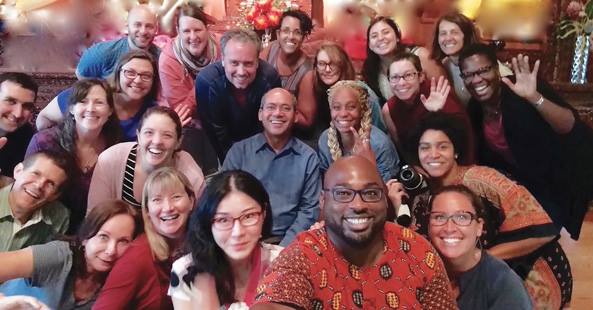
Health and Wellness: Meditation and Compassion Training

By Lisa DuPont
What is Cognitively-Based Compassion Training CBCT® ?
How can you protect and take care of yourself from the inside out when we can not control all the external factors in life such as a pandemic plus social and economic upheaval?
The skill of compassion can be seen as almost as important as eating, breathing and sleeping. Yet due to the survival mechanisms deep within our brainstem and limbic systems, when faced with high stress, we sometimes either overly perceive threats in the world or ruminate and think/act in ways that become more harmful than helpful to ourselves and others, even long after the external stressors subside. On top of that, due to our Western tendencies toward rugged individualism, we can confuse empathy and compassion as “weak”, or “unnecessary”. We now know Compassion stimulates useful brain mechanisms for dealing with stress and in turn increases effective and even creative responses. Social biologists have shown that cooperation, empathic connection and affiliation are essential for our very survival. Therefore, Compassion training acts as a protective measure to counteract proclivities toward more “reptilian” reactions in conjunction with the fight- or flight limbic reactions that invoke and increase anxiety & isolation, despair & division. Just as we wear masks to protect ourselves physically from an external virus, we can add the personal and inner protection of compassion to make us calmer, clearer and more effective at work and at home during both times of duress and more stable times.
Cognitively- Based Compassion Training – CBCT® is an evidence-based program developed at Emory University that offers one solution: a training that builds resiliency to life’s distresses while developing deeper levels of kindness and connection to oneself and others. Science is showing Compassion to be a powerful mitigation tool against burn-out in difficult times. Compassion training, therefore, serves as a profound personal and community resource. Research also shows Compassion practice adds more meaning to life, for even when the pandemic subsides, there will always be challenges in life to face.
“I learned how to stop chasing external things for happiness, stop fixing others and instead care for myself from the inside out. Slowly, I learned how to calm my mind, root out the mental habits that did not help me, become kinder to myself and then I could see I was really ready to, turn all that kindness out toward others. My family and students notice a big change in me.” ~Alex S., Teacher, Parent and local CBCT® participant
When we teach children with learning problems methods to re-route their neural connections to compensate for impaired perceptual functioning, it does not happen overnight. It is similar for meditational practice; it requires repeated practice to develop sufficient neuroplasticity for enduring change in our brains. Yet the results can and do come with consistent practice.
The purpose of this training is to help people take charge of their own lives, to reduce the internal contributions to one’s own suffering while also building skills for the inevitable outer experiences of disappointment, pain and distress we all face. Inadvertently, we tend to increase our contentment and happiness. The meditational framework used are, as previously mentioned, from an ancient practice of how to unlock one’s inherent capacity for tenderness and to enjoy increasingly meaningful connections with self and others.
For whom is this program ?
CBCT® is not therapy yet it is therapeutic as is evidenced via the research. Professionals (Physicians, nurses, therapists, social workers, counselors, teachers) who complete the CBCT® Course are entitled to apply for continuing education credits (CEUs, CNE credits or CME credits).
To learn more about CBCT and meditation classes, including an 8-week series starting February 11, visit santacruzcompassion.com.

Lisa DuPont, M.S, School Psychologist/Buddhist monastic
Certified CBCT@ Trainer; Emory University.









